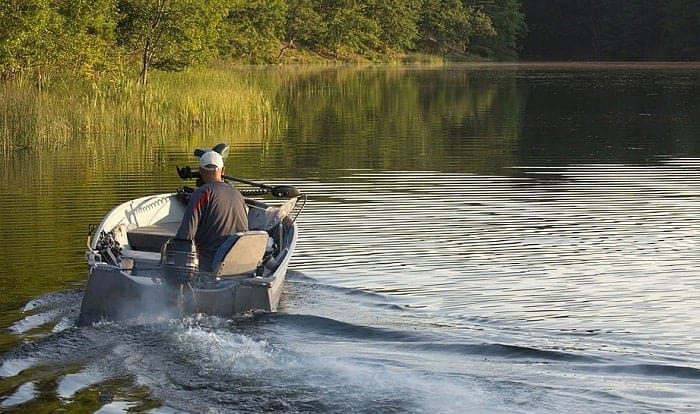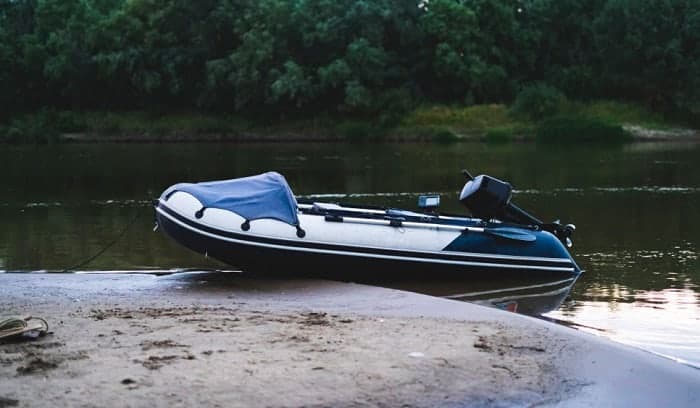Fires on motorboats are more dangerous than you would expect, and they happen far more often than you would imagine. You wouldn’t know how difficult it is to fight a fire while on the water unless you have experienced it.
I never thought that my boat would be on fire, but I realized that it could also occur to anyone when it happened to me. So, I decided to create this post as a guide about what should you do immediately if a boat motor catches fire.
Table of Contents
Procedures to Follow When Your Motorboat Catches a Fire
When your motorboat catches fire, the first thing you should do is turn off the fuel supply. If you flood the engine compartment, you risk drowning your vessel, which will be useless as it will only incur additional damages.
On the other hand, opening the engine compartment can result in even more fire because more fuel will reach the flames. Similarly, airflow could fan the fire and exacerbate it. Therefore, cutting off your fuel supply would be the best solution.
When the fuel supply is turned off, try to manage the fire using a marine-grade fire extinguisher. Aim its nozzle at the fire’s base and sweep its handle sideways. Meanwhile, ask someone else on board to call for assistance.
If you are alone onboard when this happens, seek assistance when you finish trying to put out the flame. These steps might sound easy, but there are a few other things you need to know if you want to boat safely and comfortably.
There’s a lot to worry about in the details of stopping a fire on your boat in the first place, as well as other stuff you can do right away if your motor boat catches fire. We will discuss all of these in the following section of this article.
Another helpful advice is to have a contingency plan ready for when a fire erupts onboard. It is essential to have a solution for any possible situation so that nothing may shock you, in case of emergencies. Moreover, it helps reduce the risk of panic attacks or anxiety.
For more information about what to do when your boat is on fire, you can watch this video uploaded by Grampian Marine.
What Do You Do If Your Boat Catches Fire
A fire can sometimes break out even for the most meticulous preparations regardless of how careful you have been. It is because there are several components on boats that can trigger flames or heat.
In addition to the specifics mentioned earlier, if a fire breaks out on your boat, there are a few other things you can do right away.
- If the motor boat is in motion, put it to a complete stop as soon as possible.
- Ensure that all passengers are wearing a personal flotation device (PFD). PFDs include a life jacket.
- Move your motor boat downwind so that the fires fan away from you.
- If you’ve turned off the engine, use a paddle oar to maintain your spot in the wind.
- If your boat’s front is on fire, turn the boat’s stern toward the wind.
- Apply a fire extinguisher to the flames, stopping at the firebase and sweeping back and forth.
- If there is an electrical fire, do not attempt to extinguish it with water.
- Use your VHF transmitter to request assistance.
- If necessary, get everybody wearing PFDs off the boat and into the water, away from the vessel. You can also launch a life raft if you have one onboard.
What are the Leading Causes of Boat Fires
There are many causes of boat fires, including off-shore and battery sources. However, the most common roots of fires on boats are the following:
- Fires caused by direct current electricity
- Electrical sparks in AC units
- Several other engine-related fires
- Shrink-wrapping of fuel stoves
The various fires on boats have been grouped into classes, each denoted by an alphabetical letter, as follows:
A: fires that include solids such as paper, timber, bedding, and so on.
B: fires that include liquids such as oil or gasoline.
C: gas-related explosions.
D: metal-related explosions.
F: fat and cooking oil flames.
Boat Fire Prevention Tips
Fire prevention and planning are essential for every boat owner, like other boat practices. It is because you are never completely safe from fire. Thus, you should always be ready to fight the flames, in case it occurs while you are venturing the water.
The most common technique to fight a fire easily is to check that your fire extinguishers are in good working condition. Here are other boat fire prevention tips that you can follow all the time:
- Never combine carbon, oxygen, and flame – this will result in a burn.
- Check that the ventilation systems are operational.
- Maintain the fuel system and engine daily, and keep the bilges tidy.
- Get a fire contingency plan that everyone in the vessel understands and remembers.
- Install smoke and carbon monoxide detectors on your ships.
- Test all of the boat’s alarms regularly.
- In the cabin and bilge areas, install a gas vapor detector.
- Before going to bed or leaving the port, turn off the LPG cylinder valves.
- Often double-check that the machines are turned off while not in service.
- If you smoke, use wire ashtrays to make sure your butts are fully extinguished.
- It would be best if you did not hang curtains over gas stoves in the galley.
- In the event of an emergency, have an evacuation plan in place.
First Aid Kit for Marine, Boats and Motorboats
Injuries, mild or severe, can occur anytime, especially when you are traveling on the water. These injuries are harder to aid because oftentimes, you are in a remote area. Thus, it is vital to provide basic first aid supplies to your vessel.
The basic first aid kit must include bandages, gauze pads, alcohol, betadine, gauze tape, cotton, swabs, scissors, and many more. Your supplies must correspond to your passengers’ average number on board.
Besides having a first aid kit, several means of communication should also be present onboard in case of an emergency. These include VHF radios, flares, and sound devices like horns or megaphones.
Conclusion
Boating is a luxury with many liabilities, but fires on boats are far riskier and more frequent than you would expect. Fortunately, there are many simple ways, like the ones below, that you could follow when you come across this challenging situation:
- Turn off your fuel supply immediately.
- Use a fire extinguisher if the flame is manageable.
- Ensure that all your passengers are ready for evacuation.
- Call for assistance right away.
While a fire on a well-maintained boat that meets minimum safety requirements is impossible, it is a severe problem for boaters who might be caught off guard or in a position where rescue is difficult.

“I am James Harvey – founder of Boating Basics Online. It is established with the drive to help out first-time boaters, which are those desiring to explore their way through the water. So if you are new to boating, start from here with me. “



